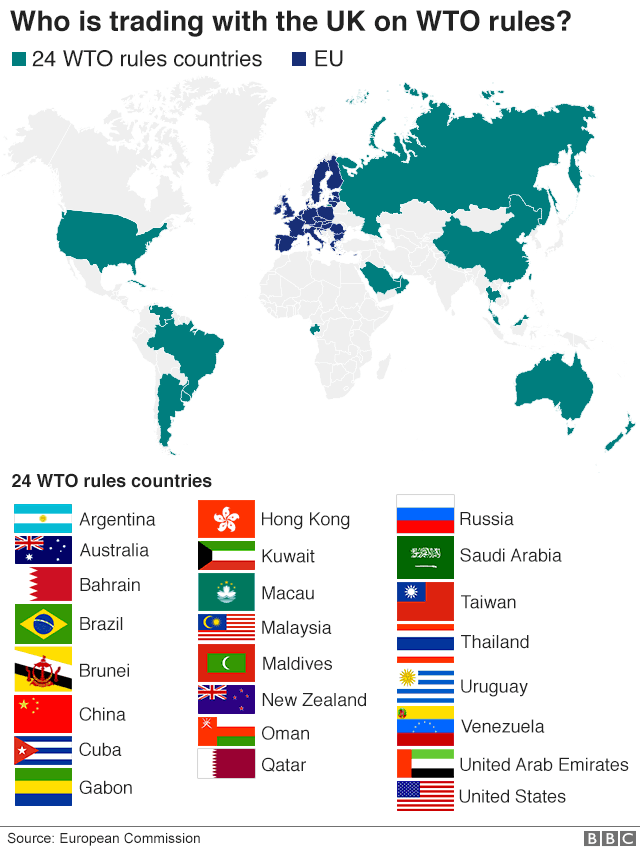Reality Check: Does the UK trade with 'the rest of world' on WTO rules?
- Published

The claim: The UK trades with "the rest of the world" (non-EU countries) under World Trade Organization (WTO) rules.
The EU and the UK have said they want to reach an agreement on future trade, but leading Brexiteers say failing to reach a deal would not be disastrous. They have said the UK could revert to rules set by the WTO, and have claimed that's how we currently trade with the rest of the world.
"It is perfectly fine for the UK to leave and trade with [the EU] as we trade with the rest of the world at the moment, under world trade rules," said MP John Redwood on 19 October.
"Even if we leave [the EU] without a deal, we still get most favoured nation status under WTO rules, which is how we trade with the rest of the world," said Bernard Jenkin MP on 17 January.
Reality Check verdict: This is wrong. With regard to tariffs, the UK trades with 24 countries and territories under WTO rules alone. With 68 others it has, as part of the EU, free trade agreements, either fully or partly in place, which all enable trade on better terms.

Currently the UK's trading relationships are based on its membership of the EU.
The EU rules prohibit individual countries from negotiating their own deal. Instead the EU negotiates trade deals on behalf of all 28 member states.


Over the years, the EU has negotiated a number of free trade deals and other agreements that enable it to trade with the rest of the world on better terms. According to the European Commission, with regard to tariffs, there are 24 countries or territories with which the EU trades on WTO rules alone.
Even with those 24, the EU has a variety of arrangements which make trade easier. For example, there is an agreement between the EU and the US, external about the language which can be used by wine exporters on their bottles.
The EU - and therefore the UK as a member - has trade deals with other countries, like South Korea, Mexico and recently Canada. The agreements vary in breadth and depth, but can mean trade happens on a "preferential basis", so tariffs are lower than the WTO maximums.
After Brexit, or any transitional period, the UK could not automatically adopt trade arrangements that currently exist between the EU and other countries - it would have to negotiate its own.
Some would be easier to nail down than others and Britain is a large market so there is a clear incentive for countries to negotiate.
What would WTO rules mean?
The UK wants to negotiate a "comprehensive, bold and ambitious" free trade agreement with the EU.
If it can't achieve that, there are a number of other possible arrangements of varying depth before the UK reaches the point where it has no preferential trade relationship with the EU other than common membership of the WTO.
If the UK had to trade under WTO rules, tariffs - a tax on traded goods - would be applied to all UK exports.
The average WTO tariff varies from product to product, from 0% on mineral fuels and pharmaceuticals, to around 20-35% on processed food and 45-50% on meat.

Source: CEPS, external
Does any other country trade on WTO rules alone?
If you look at the WTO database which lists all regional trade agreements, there is nothing for Mauritania. That's led some to suggest Mauritania is the only member to trade solely on WTO rules.
However, according to the WTO, Mauritania has joined the Economic Community of West African States, and it has preferential trade arrangements with some 20 WTO members.
There are some countries which aren't WTO members, including Algeria, Serbia and North Korea, but the WTO says all of its members have some sort of bilateral or regional trade agreement in place.
Update: There are arrangements between the EU and 24 other countries and territories that are not related to tariffs. This article has been updated to make that clearer.


